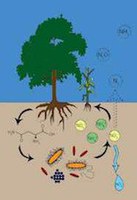Kaye Biogeochemistry Lab Group
We use ecosystem ecology as a lens to study the changing biogeochemical cycles of plants and soils. Biogeochemical cycles describe the movement and storage of energy and nutrients. We are particularly interested in the carbon and nitrogen cycles in forests and agricultural ecosystems.

In forests, a lack of nitrogen often limits plant growth and there are fascinating basic science questions regarding interactions among plants, microorganisms, soils, and hydrology. In agricultural ecosystems, fertilizers alleviate nitrogen limitation, which helps feed the growing human population, but also generates water and greenhouse gas pollution. There are pressing applied questions regarding our ability to sustain yields while reducing nitrogen pollution.
The goals of our research are to:
- Increase basic understanding of the nitrogen cycle
- Minimize nitrogen losses from agricultural ecosystems
- Discover how nitrogen losses from agricultural fields affect and are attenuated by forests and near-stream ecosystems.
We measure the flow and fate of nitrogen at scales ranging from individual microbial processes to watersheds, and occasionally across landscapes and regions. We often study interactions between nitrogen and ecosystem carbon balance to understand how changes in carbon and nitrogen cycling are linked.
The research projects page and our annotated image gallery have more details.
The Kaye Biogeochemistry Lab believes that everyone should have equal access to science, and we strive to create an environment that welcomes and respects diversity in all its forms—including cultural, racial, religious, age, gender identity, sexual orientation, physical ability, and mental wellbeing. Read more here.

